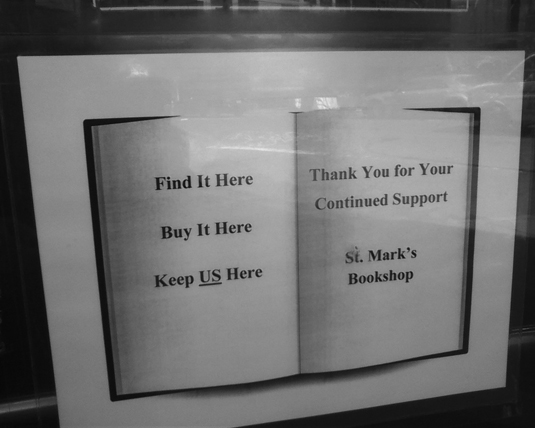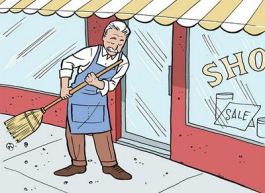I saw this sign on the door at St Mark’s Bookshop — it’s not a new sign; I’ve seen it many times — but today it made me wonder (again): Why is it our responsibility to make sure that the owner of St. Mark’s Bookshop receives a high-enough rate of return on his investment to keep him from closing? Why is it always shopkeepers making this plea, or organizing “cash mobs”?
- “Come today to St. Mark’s Bookshop and buy a book so we can pay our rent.”
- “Come today to U.S. Steel Corporation and buy 1,000 tons of steel so we can pay our directors.”
Why shouldn’t workers organize cash mobs? If they did though, no one would give them anything. Why do people feel obligated to give their money to shopkeepers but not to workers? Shopkeepers are idealized, they’re called “Mom-and-Pops”. We still think of shopkeepers wearing full-length aprons in front of their stores, sweeping the sidewalk.
One reason to keep these stores open might be to keep the workers there employed*, and that’s not nothing (in fact it’s something), but it’s not the reason people do this. The reason people participate in these efforts is that it says something about them. If I live in a neighborhood where there is a St. Mark’s Bookshop, it forms part of my experience of living in New York City. For people for whom that is important, I say fine, buy your books at St. Mark’s, and your cupcakes at Butter Lane, and your kitsch at Alphabets.
But, this reason is valid only to the degree that what I view as an authentic urban experience is dictated by the shops that surround me, that is, by what I am able to buy. Urban life becomes a shopping experience. I am validated by my purchases.
How do people decide which stores form their experience and which don’t? What if the sign were hanging up in a nail salon? Would people rally around the nail salon? Or a dry cleaner’s? There’s nothing democratic about it. Voting with your wallet isn’t democracy, and too many people’s wallets are empty.
It’s probably true that bookstores are something that should exist in a city, that if there were no bookstores then the city would be worse off for it. I am not against bookstores. I’m not even against St. Mark’s Bookshop. I used to go there all the time, even back when it was on St. Mark’s Place. And when I had money, I used to buy books from them, books being among those objects I deigned to spend money on, being someone at that time who defined myself in part by my book purchases. I was even there today — if it hadn’t been there, I wouldn’t have been inspired to write about them, just as I have never been inspired to write about St. Mark’s Buggywhips.
=-=-=-=-=
*What jobs are we protecting? There’s no doubt that the job sucks and is low-paid. If St. Mark’s Bookshop closed and another store opened and kept all the same employees, they’d still have meaningless, low-paying jobs. There are no other jobs. Still, it would be less disruptive to their lives if they could keep the same job, without a break in their paychecks, than to have to begin a new job doing some different meaningless task, even in the same location.


Mar 27, 2013 @ 11:11:16
I used to shop at St Mark’s Bookshop whenever I was in the East Village. I liked the store itself, especially the cramped upstairs-downstairs space of their original location. I discovered St Mark’s at the same moment I discovered the East Village so the shop was inseparable from a handful of others in the area that loomed large in my imagination in those early days — Revenge Clothing, Manic Panic, CBGBs, Kiev. Over time that connection has faded. I no longer equate St Mark’s with the East Village. I’ve even stopped buying books there even though I frequently use the store as a meet-up location. It’s not that they don’t have my sympathy. Between high rent, competition from Barnes & Noble’s and online retailers like Amazon, it’s hard to see how any independent bookstore could survive this economy. But for the last year or so they have adopted an approach — I hesitate to call it a business strategy — that I find off-putting. They have stopped restocking their shelves. Half sit empty. Going in there makes me want to NOT buy anything. Why contribute to a sinking ship? I suppose as St Marks goes, so goes the East Village. And I know if I don’t shop there — or at other struggling independents — I am playing my own small part in killing off what little remains of a place, subculture and time I once held dear.
These days my loyalties have shifted to supporting endangered but not yet doomed independents in my part of Brooklyn. I don’t rally for the nail salon but I did drop Netflicks in favor of the local video store. Part of the reason is that the video store is well run whereas Netflicks did things that annoyed me. Part of it is that my daughter likes to stop by and chat with the owner, an engaging Russian emigre, and so it has become a part of my attachment to the local community in which I now live. I guess the larger point is that support for a local business can be many things, a way of consuming an urban experience (what St Mark’s was for me 30 years ago), an expression of support for a community (what the video store is for me today), or just a place to make a purchase while killing time (what St Mark’s could be if they restocked their shelves).